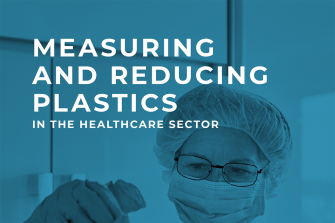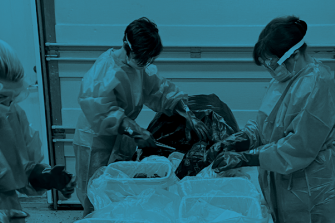The healthcare sector is a major contributor to plastic waste, which harms the environment and human health.
The #ReducePlasticsInHealthcare movement raises awareness, educates healthcare professionals, and promotes sustainable alternatives to transform current practices and support the healthcare sector’s transition to a circular economy model.
Based on current consumption, plastic production is projected to double in the next 20 years and triple by 2060. Increased plastic production will only lead to greater negative impacts on our environment and our health and will further complicate plastic waste management.
Data from NHS Supply Chain (2014–2015) reveals that 15 product categories made up 69% of the total plastic usage by weight. Over half of this came from single-use disposable items such as gloves, protective clothing, wipes, bags, continence care products, and suction consumables.
Why reducing plastics in healthcare matters
From production to use and disposal, plastics can have harmful effects. They are often overused and rarely recycled in healthcare settings. Reducing plastic use in healthcare has numerous benefits for patients and healthcare facilities. By reducing plastic, healthcare facilities can improve patient safety and limit exposure to toxic chemicals and harmful microplastics. The sector can also save costs by reducing waste management expenses and promoting more sustainable practices. Additionally, reducing plastic use in healthcare supports public health, helping to create healthier communities and protecting the environment.
Join the #ReducePlasticsInHealthcare movement and explore our resources below.
Featured resources
- PVC Frequently Asked Questions (10/2024)
- PVC Problem Very Clear (06/2024)
- Towards PVC-free healthcare: Reducing environmental impact and exposure to harmful chemicals (05/2023)
- Reducing plastic in healthcare | Best practice (06/2022)
- The role of chemistry in sustainable medical textiles (12/2021)
- Measuring and reducing plastics in the healthcare sector (09/2021). Also available in Spanish, French, Dutch and Portuguese
- Sustainable food contact materials in the European healthcare sector (07/2021). Also available in Spanish, French, Dutch and Portuguese
- Non-toxic healthcare: Alternatives to phthalates and bisphenol A in medical devices (12/2019)
- Strategic procurement in European healthcare (12/2019). Also available in Spanish.
- Setting sustainability criteria in healthcare tenders (03/2019)
- Guidelines for the procurement of safer medical devices (12/2018)
- Current practices for the procurement of medical devices in Moroccan hospitals (07/2018). Also available in French.
- Factsheet | Medical Devices Regulation: An engine for substitution? (12/2017)
- Infographic | Sustainable waste management - A guide for the healthcare sector
- Reducing plastic in healthcare | Best practice (06/06/2022)
- Crunch time for the EU – restrict hazardous chemicals affecting infants (03/03/2022)
- Promoting sustainable food contact materials in Spanish and Portuguese (24/11/2021)
- Measuring and reducing plastics in Spanish healthcare (28/10/2021)
- Sustainable food contact materials in healthcare (01/07/2021)
- Why PVC remains a problematic material (23/06/2021)
- Building resilience: Evaluating the case for reusable medical protective clothing (29/03/2021)
- On the road to circular healthcare - reusing medical devices (25/03/2021)
- Medical textiles - why chemistry matters (18/12/2020)
- Do bio-based plastics help achieve sustainability goals? (12/08/2020)
- Webinar | Reducing plastic and harmful chemical exposure to children [EN, FR, ES, NL] (07/12/2022)
- Webinar | How to reduce the impact of plastics in healthcare [EN, FR, ES, NL, EL] (28/11/2022)
- Webinar | How to measure and reduce plastic in healthcare (08/07/2021)
- Webinar | Driving the circular economy in healthcare through innovation procurement (30/06/2021)
- Webinar | Towards safe and sustainable food contact materials in European healthcare (04/03/2021)
- Webinar | Towards plastic-free healthcare (02/07/2020)

